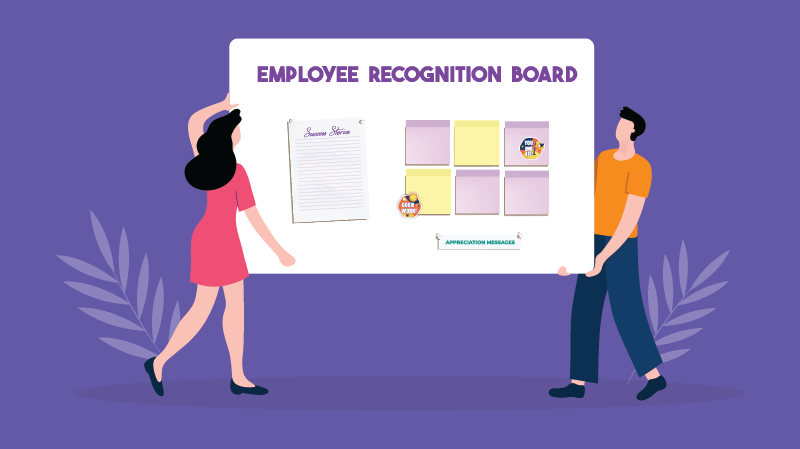Employee Promotion: The Types, Benefits, & Whom to Promote
“Employee Promotion.” You can ask any employee what motivates them, and this aspect is sure to pop up. It’s human nature to grow, and your employees are no exception. Understanding this, let’s talk about the different bits of employee promotion in the workplace.
What is Employee Promotion?
Employee Promotion means the ascension of an employee to higher ranks. It involves an increase in salary, position, responsibilities, status, and benefits. This aspect of the job drives employees the most—the ultimate reward for dedication and loyalty towards an organization.
In theory, a promotion requires more work and effort in a job. Based on organizational policies, these promotion-based decisions are taken on different aspects. These can be the length of service, experience, seniority, performance, etc.
Owing to this, there are four different types of promotions for employee development.
Types of Employee Promotion
1. Horizontal Promotion:
This kind of promotion rewards an employee with a pay increase but little to no change in responsibilities. It is also regarded as an up-gradation of an employee. In the educational sector, an example of this is the move from lecturer to senior lecturer.
2. Vertical Promotion:
This refers to an upward movement of employees with a change in skills and experience. It brings a change in salary, responsibility, status, benefits, etc. In the marketing industry, this can be the promotion of a marketing supervisor to the marketing manager.
Due to its nature, it can change the nature of the job as well. This can be a shift from functional head to the chief executive, both being very different jobs.
3. Dry Promotion:
A Promotion that employees aren’t particularly fond of. This promotion refers to an increase in responsibilities and status without the benefits. It means no increase in pay or any financial benefits for that matter.
4. Open and Closed Promotion:
Open Promotion is a situation wherein every individual of an organization is eligible for the position. Closed Promotion is a situation wherein only selected team members are eligible for a promotion.
Benefits of Employee Promotion
1. Expectation:
Employee Promotion is one of the main goals of employees working hard. Thus, it turns into their expectation. When employers don’t fulfill these expectations, they end up losing employees.
A study conducted shows that 40% of millennials expect a promotion in one to two years. It also states that if not provided with one, they will leave a company searching for opportunities elsewhere.
2. Reduce Attrition:
Employee Promotion often includes a pay raise which acts as a huge motivation. This, in return, further reduces attrition. A survey published shows 35% of employees quitting their job because of no pay raise in a year.
3. Motivation & Productivity:
As stated above, employee promotion is a big tool for career advancement and employee retention. It is because when employees get a chance to grow, they stick with a company. This motivation ultimately correlates to higher productivity.
4. Cost-Efficient:
Internal employee promotion involves less cost than hiring new ones. This is a fact that is shown in a study published by The Wall Street Journal. It was found that companies pay 20% more in onboarding a new hire instead of internally promoting one. This harms the desired cost-cutting measures of a company.
5. Career Growth:
Employee promotion facilitates the critical career path and growth of an individual. A statistic in 2017 showed that lack of career development is one of the key reasons for attrition. Even in this day and age, it is bound to be one of the main concerns of employees.
6. Need to Manage:
Employee Promotion often brings new responsibilities that initiate a sense of management. This sense of management is a key factor in employee satisfaction as it helps them grow. In a detailed study, it was found that 45% of millennials are keen on managing others.
7. Rewards and Recognition:
Employee promotion is a crucial element of an organization’s rewards and recognition program. This is because a study shows more than a quarter of employees leave the organization for lack of rewards recognition.
This reduces retention, employee engagement, and motivation.
These were a few of the reasons why employee promotion is so important in a company.
Who to Promote in your next Employee Promotion Phase?
Now that we have covered the benefits and types, let’s get on to the final topic- Which individual contributors promote an organization?
As discussed earlier, the human resources department can base its decision on many levels. To help you here, our pointers are on how to choose which individual to promote next.
1. Role:
While searching for individuals to promote, you must look at their current roles. Sometimes, it so happens that an employee is doing much more than his/her title requires. In reality, that employee absorbs more responsibilities.
If such employees exist who are already doing the vacant job title, then you must promote them.
2. Appraisal:
While taking into account employee promotion, managers must also look into the last appraisal of employees. It is human nature to desire higher positions. If you find a person who has gone long enough without promotion, it will harm their employee satisfaction.
This leads to attrition. If you find an employee whose last appraisal has been quite a while and fits an ongoing promotion, choose them.
3. Emotional Intelligence:
Emotional Intelligence is essential in a higher-level job. It refers to the skill set required to connect with others. This is a key aspect of managers as they must be able to connect well with others. If your managers can’t connect with the team, how will they lead them?
In your next employee promotion cycle, keep an eye out on the Emotional Intelligence of your candidates.
4. Performance Review:
Statistics- The oldest trick in the book to come last. When all else fails, you must always turn to the employee performance numbers. In these cases, there are several methods you can utilize to analyze employees.
These are 360-degree review, Assessment Centre Method, Management by Objectives, etc. After analyzing, you must promote the ones who fit well for a promotion.
5. Company Culture:
Promoting someone means showing a welcome sign to further invest in a company. Here, you should always keep an eye out for how an employee fits into the corporate culture. His behavior with colleagues, managers, bosses, and how he/she looks up to the company.
Is that person able to sit well with the entire company culture and the level positions that the job requires? If you find that the employee fits well, you should consider a promotion to the higher management role.
These were our pointers on choosing the right internal candidate for employee promotion.
Conclusion
Employee Promotion plays a big role in Employee Satisfaction. It aids in employee engagement, boosts morale, reduces absenteeism, and ultimately in productivity.
Employee Promotion is also a helpful tool for reducing attrition retention. Attrition has been a dominant problem in all companies. By practicing proper performance appraisals and employee promotion, this problem can be tackled.
So, for the reasons stated above, companies must promote deserving employees in timely intervals. Promoting equals progress, and progress is what’s best for business.




















